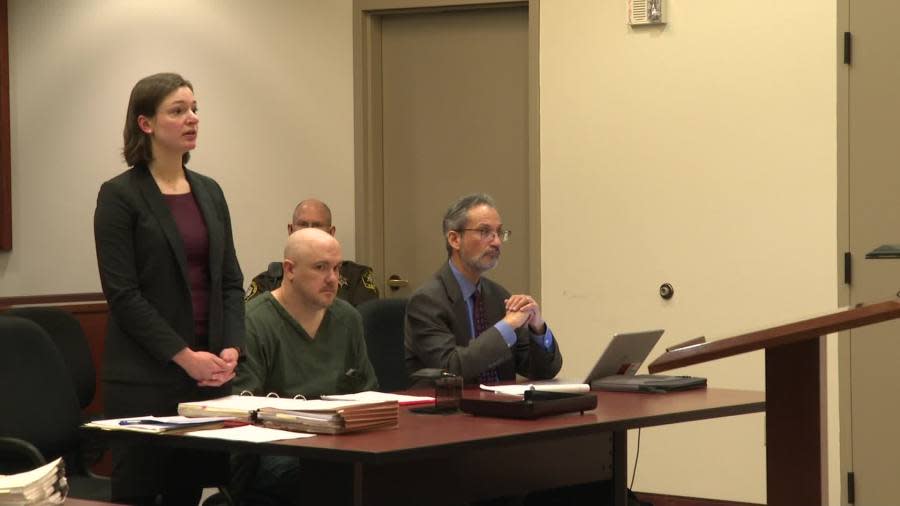With 2nd resentencing ordered, ‘juvenile lifer’ could get chance at parole
GRAND RAPIDS, Mich. (WOOD) — The man convicted of raping and murdering a young woman in northeast Grand Rapids in 1999 is seeking a new sentence that could allow him to be released from prison.
Marc Osborne is currently serving a life sentence without the possibility of parole for the killing of 18-year-old Jessica Ledford at Highland Park.

Days after her body was found, her mother shared her heartbreak.
“It’s just kind of hard to see somebody who gave so much and was so real to have her life ended in such a violent manner,” she told News 8 at the time.
Ledford’s boyfriend said everyone called her generous.
“She had (taken) a lot of pride in saying her money was not for herself, it was to help others out,” he said in 1999.
‘Juvenile lifers’ get second, third chance at sentencing

Osborne was 17 at the time of the murder. In 2012, the U.S. Supreme Court ruled that mandatory life sentences without parole were unconstitutional for juveniles. Four years later, it decided that prisoners who were previously given automatic life sentences without parole must have their cases reviewed. That kicked off a series of appeals aimed to get Osborne out of prison. Supreme Court instructions required judges to consider child and family circumstances as part of reviewing the sentences.
Osborne’s first appeal in 2018 was unsuccessful. While Kent County Circuit Judge Mark Trusock said that Osborne had the fewest number of misconducts he had ever seen on a record for review, he called the killing “deeply disturbing” and upheld the sentence.
Osborne later got a new attorney, Claire Ward, from the State Appellate Defender Office. She argued in a 2020 appeal that his previous lawyer didn’t provide testimony about his childhood trauma, including sexual abuse, neglect, and mental illness and alcoholism in his home. Trusock disagreed that Osborne’s prior attorney was ineffective and upheld his life sentence once again. A 2021 Michigan Court of Appeals ruling agreed with Trusock.
‘Juvenile lifer’ to get shorter sentence for Walker triple murder
But just days ago, on March 1, the Michigan Supreme Court reversed that decision and sent the case back to Trusock. The high court cited a 2022 change in state law that puts the burden on the prosecution to prove Osborne deserves life in prison without parole and incapable of rehabilitation.
“A court may not impose a sentence of life without parole on a defendant who was under 18 years of age at the time of his crime unless the prosecution has overcome its burden to rebut the presumption, by clear and convincing evidence, that life without parole is a disproportionate sentence,” the court wrote.
Ward, who still represents Osborne, told News 8 over the phone Tuesday that she is not contesting that the crime happened.
“It was a terrible crime and Marc is remorseful for it and has expressed that remorse in court before,” she said.
At the time of the murder, Ward said Osborne was impulsive, immature and suffering from his abuse. She argued he has changed in the last 25 years, behaving well in prison and completing an associate degree from Calvin University.
“He is a religious, kind, caring man,” Ward said. “He is certainly not a juvenile who cannot be rehabilitated. He is well on his way to being rehabilitated, if not already rehabilitated.”
Ward said it’s highly unlikely that Trusock will hear the case this year, saying the investigation for resentencing typically takes at least a year.

The Kent County Prosecutor’s Office has consistently argued that Osborne should spend the rest of his life in prison. Travis Earley, its senior assistant prosecuting attorney, told News 8 the office will have to consider how the new standard for life without parole for juveniles relates to the Osborne case.
Family of murdered man: ‘Infuriating’ juvenile lifer will walk free
Earley added that higher courts don’t appear to realize how hard new hearings can be on victims’ families.
“For instance, we had one of these resentencing hearings in 2018 on the Osborne case when the standard of proof and burden was different,” Earley said. “Now, we have to do so all over again but with a new standard/burden. It’s very frustrating for those families.”
Osborne’s defense is asking for a minimum sentence between 25 and 40 years. If Osborne is given credit for time served, he could go before a parole board and ask to be let out of prison.
State appellate defender attorneys have argued that mandatory life sentences for people between 19 and 25 years old may also be “cruel or unusual punishments under the Michigan Constitution.”
“The (U.S.) Supreme Court … said the crime is not enough when you are looking at a child,” Ward said. “Even when children commit the most heinous crimes, they may still be capable of rehabilitation and that their brains are still maturing and they may still be deserving to go home one day.”
Crime by ‘juvenile lifers’ after prison ‘very rare,’ state says
The victim’s stepmother told News 8 after the 2020 appeal that if Osborne was remorseful, he would agree to suffer the consequences of his actions.
“If he was truly sorry, he would not keep putting Jessica’s family through this constantly over and over,” she said.
For the latest news, weather, sports, and streaming video, head to WOODTV.com.

